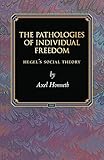The Pathologies of Individual Freedom : Hegel's Social Theory / Axel Honneth.
Material type: TextSeries: Princeton Monographs in Philosophy ; 30Publisher: Princeton, NJ : Princeton University Press, [2022]Copyright date: ©2010Description: 1 online resource (96 p.)Content type:
TextSeries: Princeton Monographs in Philosophy ; 30Publisher: Princeton, NJ : Princeton University Press, [2022]Copyright date: ©2010Description: 1 online resource (96 p.)Content type: - 9781400835027
- Ethics
- Law -- Philosophy
- Natural law
- PHILOSOPHY / History & Surveys / Modern
- Aristotle
- Hegel and Modern Society (Taylor)
- Marxism
- Piaget, Jean
- Rousseau, Jean-Jacques
- Taylor, Charles
- Walzer, Michael
- Wittgenstein, Ludwig
- action theory
- basic goods
- burdens
- capitalism
- categorical imperative
- civic duties
- communitarianism
- constitutional patriotism
- constructivism
- corporation/community
- democratic will
- diagnosis of the age
- duty
- education
- ethics
- feelings
- friendship
- indeterminacy, suffering from
- individualism’s threat
- interests
- intersubjectivity, repression of
- language games
- legal freedom
- liberalism
- liberation
- market-mediated circulation
- marriage
- moral relativism
- object relations
- objective spirit
- occupational groups
- philosophical therapy
- psychoanalytic theory
- religion
- restraint
- romantic individualism
- romantic subjectivity
- suffering, generally
- trust
- universal rights as basic goods
- vacuity
- volitions, first- vs. second-order
- women’s roles
- 340/.11 22
- K230.H432
- K230.H432 H663 2016eb
- online - DeGruyter
| Item type | Current library | Call number | URL | Status | Notes | Barcode | |
|---|---|---|---|---|---|---|---|
 eBook
eBook
|
Biblioteca "Angelicum" Pont. Univ. S.Tommaso d'Aquino Nuvola online | online - DeGruyter (Browse shelf(Opens below)) | Online access | Not for loan (Accesso limitato) | Accesso per gli utenti autorizzati / Access for authorized users | (dgr)9781400835027 |
Frontmatter -- Contents -- Acknowledgments -- I Hegel’s Philosophy of Right as a Theory of Justice -- II The Connection between the Theory of Justice and the Diagnosis of the Age -- III The Theory of Ethical Life as a Normative Theory of Modernity -- Index
restricted access online access with authorization star
http://purl.org/coar/access_right/c_16ec
This is a penetrating reinterpretation and defense of Hegel's social theory as an alternative to reigning liberal notions of social justice. The eminent German philosopher Axel Honneth rereads Hegel's Philosophy of Right to show how it diagnoses the pathologies of the overcommitment to individual freedom that Honneth says underlies the ideas of Rawls and Habermas alike. Honneth argues that Hegel's theory contains an account of the psychological damage caused by placing too much emphasis on personal and moral freedom. Although these freedoms are crucial to the achievement of justice, they are insufficient and in themselves leave people vulnerable to loneliness, emptiness, and depression. Hegel argues that people must also find their freedom or "self-realization" through shared projects. Such projects involve the three institutions of ethical life--family, civil society, and the state--and provide the arena of a crucial third kind of freedom, which Honneth calls "communicative" freedom. A society is just only if it gives all of its members sufficient and equal opportunity to realize communicative freedom as well as personal and moral freedom.
Mode of access: Internet via World Wide Web.
In English.
Description based on online resource; title from PDF title page (publisher's Web site, viewed 29. Jul 2022)


